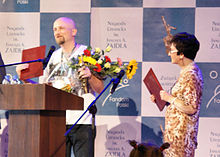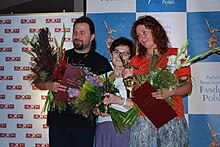Janusz A. Zajdel Award
| Janusz A. Zajdel Award | |
|---|---|
 The statuette of the Janusz A. Zajdel Award. | |
| Country | Poland |
| Presented by | the Polish science fiction and fantasy fandom |
| First awarded | 1984 |
| Website | zajdel |



The Janusz A. Zajdel Award (Nagroda imienia Janusza A. Zajdla), often called just Zajdel, is the annual award given by the Polish science fiction and fantasy fandom for the best stories published in the previous year. It was established in 1984.
It is the most prestigious of several Polish awards for that genre of literature.[1][2]
Categories
[edit]The winners are chosen in a vote by fans present at the annual Polcon convention from up to five nominations in each of two categories:[3]
- Novel: works longer than approximately 30,000 words[4]
- Short story: shorter works.
Instant-runoff voting with "No award" as one of the choices is the method used.[3] Vote counts are not announced.
History
[edit]Previously the Polish Union of Fans of Science Fiction (Polskie Stowarzyszenie Miłośników Fantastyki) issued the Golden Sepulka Award for works of science fiction (1983-1986).[5]
The Zajdel award was created in 1984 (to be awarded from 1985) under the name Sfinks (not to be confused with the Sfinks Award, an award of the SFinks magazine). After the death of the first winner, Janusz A. Zajdel, in 1985, the name was changed in his memory. Zajdel's widow, Jadwiga Zajdel, has presented the award to the winners since then.[4][6]
Until 1989, the award was given by Polish science fiction fan associations, voting as units; since 1990, all fans present at Polcon convention can vote. Since 1991 the system has been based on two-tier ballot, compared to the system used in the Hugo Award.[4][7]
Until 1991, there was a single award given for the best story; since 1992, there are two categories: novel and short story.[7] The year 1991 also saw the introduction of the Zajdel statuette, designed by sculptor Wiesław Bielak.[7]
In 2014, a free online e-book of the stories nominated for year 2013 was made available.[8]
Winners
[edit]The year given is the year of publication. Since 1992, novels and short stories have been judged separately. The winners of the award are:[9]
Winner summaries
[edit]2019: Radek Rak, Baśń o wężowym sercu...
[edit]The novel is loosely based on the legends about Jakub Szela, the leader of a 1846 peasant uprising known as the Galician slaughter. It gained several other literary awards.[11]
2019: Marta Potocka, "Chomik"
[edit]Marta Potocka is a young writer, with several short stories. She works as a programmer. Her winning work "Chomik" ["Hamster"] was published in the e-zine Esensja, no. 5, 2019. The story is set in the near future Poland. The heavily criticized Social Insurance Institution is closed and the basic social security payment is introduced to everybody subject to the condition that to qualify for it the person must join the program of Social Monitoring. The Social Insurance Institution is replaced with the Social Balance Institution, whose function is to control that people spend as much money as possible. Those who do not want to spend are called "hamsters", i.e., "hoarders". An employee of SII tries to handle a particularly tough "hamster" and fails, but instead uncovers a much larger problem. [11] Chomik is available online.[12]
References
[edit]- ^ "List of Contributors", Witchcraft Mythologies and Persecutions, Central European University Press, 2008-05-10, pp. 315–320, doi:10.1515/9786155211508-017, ISBN 978-615-5211-50-8, retrieved 2024-01-21
- ^ Klaniczay, G. bor; P¢cs, ?va (2008-01-01). Witchcraft Mythologies and Persecutions. Central European University Press. p. 295. ISBN 978-963-7326-87-5.
- ^ a b "FAQ". Nagroda Zajdla (in Polish). Retrieved 2024-01-10.
- ^ a b c "SFE: Janusz A Zajdel Award". sf-encyclopedia.com. Retrieved 2024-01-10.
- ^ "Nagroda Złotej Sepulki"
- ^ Związek Stowarzyszeń "Fandom Polski", ed. (2006). Nagroda im. Janusza A. Zajdla: antologia utworów nominowanych za rok. Warszawa: Związek Stowarzyszeń "Fandom Polski". p. 205. ISBN 9788392125693.
- ^ a b c "Historia". Nagroda Zajdla (in Polish). Retrieved 2024-01-10.
- ^ "Opowiadania nominowane do Zajdla jako e-booki!" Archived 2014-09-14 at the Wayback Machine, July 9, 2014 (retrieved August 18, 2014)
- ^ "Laureaci". Nagroda Zajdla (in Polish). Retrieved 2024-01-10.
- ^ "Nominacje Nagrody Fandomu Polskiego im. Janusza A. Zajdla w latach 2010−2019". Archived from the original on 2018-10-09. Retrieved 2020-11-22.
- ^ a b Radek Rak i Marta Potocka laureatami Nagrody im. Janusza A. Zajdla za 2019 rok
- ^ Chomik , Marta Potocka
